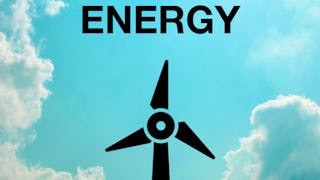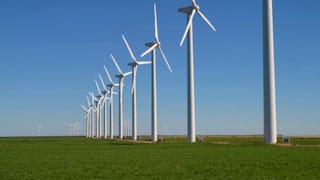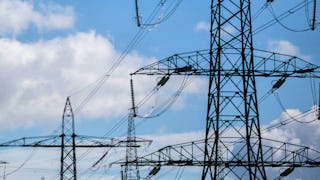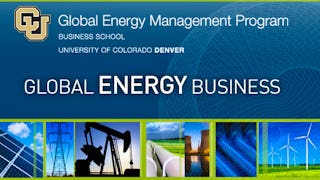Filter by
SubjectRequired
LanguageRequired
The language used throughout the course, in both instruction and assessments.
Learning ProductRequired
LevelRequired
DurationRequired
SkillsRequired
SubtitlesRequired
EducatorRequired
Explore the Energy Engineering Course Catalog

The State University of New York
Skills you'll gain: Electric Power Systems, Electrical Systems, Electrical Power, Energy and Utilities, Basic Electrical Systems, Building Services Engineering, Sustainable Technologies, Cost Estimation, Engineering Calculations, Safety Standards, Environmental Issue, Systems Of Measurement, Technical Standard
 Status: Free Trial
Status: Free TrialUniversity of Colorado Boulder
Skills you'll gain: Feasibility Studies, Plant Operations and Management, Project Finance, Electric Power Systems, Electrical Power, Energy and Utilities, Basic Electrical Systems, Sustainable Technologies, Systems Of Measurement, Project Implementation, Financial Analysis, Market Dynamics, Climate Change Mitigation, Project Management Life Cycle, Construction Management, Emerging Technologies, Project Management, Environmental Issue, Mechanical Engineering, Physics
 Status: Preview
Status: PreviewTechnical University of Denmark (DTU)
Skills you'll gain: Sustainable Engineering, Forecasting, Mechanical Engineering, Financial Forecasting, Engineering Calculations, Engineering, High Voltage, Systems Engineering, Materials science, Energy and Utilities, Electrical Power, Structural Analysis, Financial Analysis, Environmental Monitoring, Failure Analysis
 Status: Free Trial
Status: Free TrialL&T EduTech
Skills you'll gain: Oil and Gas, Petroleum Industry, Hazard Analysis, Safety Standards, Environmental Resource Management, Energy and Utilities, Environmental Regulations, Environment Health And Safety, Big Data, Plant Operations and Management, Waste Minimization, Process Engineering, Chemical Engineering, Risk Analysis, Environmental Engineering, Failure Mode And Effects Analysis, Data Management, Pump Stations, Data Processing, Process Control
 Status: Free Trial
Status: Free TrialUniversity at Buffalo
Skills you'll gain: Electrical Substation, Electrical Power, Electric Power Systems, Electrical Systems, Energy and Utilities, Basic Electrical Systems, Electrical Equipment, Electrical Safety, Low Voltage, High Voltage, Sustainable Technologies, Emerging Technologies
 Status: Preview
Status: PreviewUniversity of Colorado System
Skills you'll gain: Energy and Utilities, Oil and Gas, Strategic Thinking, Global Marketing, Business Analysis, Business Economics, Supply And Demand, Stakeholder Analysis, Business Analytics, Economics, Political Sciences, Environment and Resource Management, Natural Resource Management, Emerging Technologies
What brings you to Coursera today?

The State University of New York
Skills you'll gain: Electrical Power, Basic Electrical Systems, Electric Power Systems, Wiring Diagram, Equipment Design, Energy and Utilities, Electronic Components, Sustainable Design, System Requirements, Electrical Safety, Engineering Calculations, Performance Testing, Physical Science, Estimation
 Status: Free Trial
Status: Free TrialUniversity of Colorado Boulder
Skills you'll gain: Energy and Utilities, Electrical Power, Sustainable Technologies, Electric Power Systems, Basic Electrical Systems, Environmental Issue, Mechanical Engineering, Physics, Emerging Technologies, Cost Estimation
 Status: Preview
Status: PreviewUniversity of Michigan
Skills you'll gain: Mechanical Engineering, Thermal Management, Engineering, Energy and Utilities, Physics, Engineering Analysis, Systems Of Measurement, Physical Science, Process Analysis, Environmental Issue
 Status: Free Trial
Status: Free TrialUniversity of Colorado Boulder
Skills you'll gain: Sustainable Design, Sustainable Technologies, Sustainable Engineering, Sustainable Business, Energy and Utilities, Sustainable Development, Corporate Sustainability, Strategic Leadership, Product Engineering, Environmental Management Systems, Environmental Engineering, Waste Minimization, Packaging and Labeling, Product Lifecycle Management, Climate Change Mitigation, Emerging Technologies
 Status: Free Trial
Status: Free TrialArizona State University
Skills you'll gain: Engineering Design Process, Engineering Drawings, Prototyping, Product Design, Product Development, Hardware Design, Research and Design, Design Specifications, Ideation, User Feedback
 Status: NewStatus: Free Trial
Status: NewStatus: Free TrialUniversity of Colorado System
Skills you'll gain: Systems Engineering, Verification And Validation, Team Management, Systems Architecture, Requirements Analysis, Requirements Elicitation, Scrum (Software Development), Systems Development Life Cycle, Teamwork, Configuration Management, Team Building, Agile Methodology, Scaled Agile Framework, Systems Development, Team Motivation, Organizational Leadership, Engineering Management, Risk Management, Waterfall Methodology, Leadership and Management
Energy Engineering learners also search
In summary, here are 10 of our most popular energy engineering courses
- Solar Energy Basics: The State University of New York
- Renewable Energy: University of Colorado Boulder
- Wind Energy: Technical University of Denmark (DTU)
- Petroleum Engineering with AI Applications: L&T EduTech
- Electric Power Systems: University at Buffalo
- Fundamentals of Global Energy Business: University of Colorado System
- Solar Energy System Design: The State University of New York
- Renewable Energy Technology Fundamentals: University of Colorado Boulder
- Introduction to Thermodynamics: Transferring Energy from Here to There: University of Michigan
- Applied Sustainability Engineering: University of Colorado Boulder










